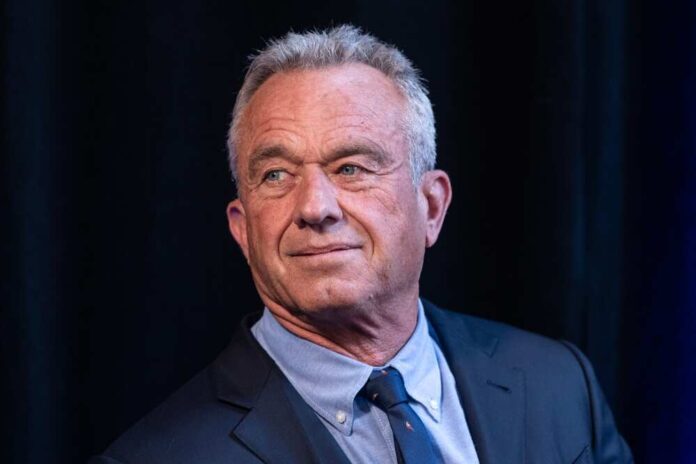
Donald Trump’s nomination of Robert F. Kennedy Jr. as Health and Human Services Secretary signals a potential overhaul of U.S. health policy, prioritizing public welfare over pharmaceutical interests.
At a Glance
- Trump nominates Robert F. Kennedy Jr. as Secretary of Health and Human Services (HHS)
- The move aims to restore “Gold Standard Scientific Research” and prioritize Americans’ health
- Kennedy’s appointment could disrupt close ties between Big Pharma and the federal government
- Trump criticizes the influence of industrial food complex and pharmaceutical companies on public health
- The nomination represents a shift towards more organic and health-focused initiatives
Trump’s Bold Move in Health Policy
In a significant development for U.S. health policy, former President Donald Trump has announced his nomination of Robert F. Kennedy Jr. as the Secretary of Health and Human Services (HHS). This decision marks a potential shift away from industry-dominated health policies towards a model that prioritizes public welfare over economic interests.
Trump’s choice of Kennedy, known for his vocal criticism of the pharmaceutical industry and advocacy for natural health measures, signals a departure from traditional approaches to health administration. The nomination underscores Trump’s commitment to addressing what he perceives as longstanding issues within the U.S. healthcare system.
Restoring Trust in Health Agencies
Trump’s announcement emphasizes the importance of restoring public trust in health agencies. The former president believes that Kennedy’s appointment will lead to a revival of rigorous scientific research and increased transparency in health-related decision-making processes.
“I am thrilled to announce Robert F. Kennedy Jr. as The United States Secretary of Health and Human Services (HHS),” stated Donald Trump.
The nomination reflects Trump’s critique of the current health landscape, which he believes has been negatively influenced by industrial and pharmaceutical interests. By appointing Kennedy, Trump aims to address these concerns and refocus health policies on the wellbeing of American citizens.
Challenging Big Pharma’s Influence
A key aspect of Kennedy’s potential role as HHS Secretary would be to challenge the close relationship between the pharmaceutical industry and government agencies. Trump has expressed his intention to end the “revolving door” between these sectors, which he sees as detrimental to public health.
“For too long, Americans have been crushed by the industrial food complex and drug companies who have engaged in deception, misinformation, and disinformation when it comes to Public Health.” Trump emphasized.
This stance aligns with Kennedy’s long-standing criticism of Big Pharma and his advocacy for more natural and holistic approaches to health. If confirmed, Kennedy’s appointment could lead to significant changes in how health policies are formulated and implemented at the federal level.
Addressing Environmental Health Concerns
Trump’s nomination of Kennedy also highlights a renewed focus on environmental factors affecting public health. The former president stressed the importance of protecting Americans from harmful chemicals, pollutants, and pharmaceutical products that may contribute to health issues.
“The Safety and Health of all Americans is the most important role of any Administration, and HHS will play a big role in helping ensure that everybody will be protected from harmful chemicals, pollutants, pesticides, pharmaceutical products, and food additives that have contributed to the overwhelming Health Crisis in this Country. Mr. Kennedy will restore these Agencies to the traditions of Gold Standard Scientific Research, and beacons of Transparency, to end the Chronic Disease epidemic, and to Make America Great and Healthy Again!” Trump declared.
This comprehensive approach to health policy, encompassing both medical and environmental factors, represents a potential paradigm shift in how the federal government addresses public health concerns. Kennedy’s background in environmental law and advocacy could bring a unique perspective to the role of HHS Secretary.
Potential Challenges and Controversies
While Trump’s nomination of Kennedy has been met with enthusiasm from some quarters, it also faces potential challenges. Kennedy’s past statements on vaccines and other health issues have been controversial, and his views on certain social issues may not align with traditional conservative positions.
Despite these concerns, Trump and his supporters view Kennedy’s stance against Big Pharma and his commitment to public health as outweighing potential ideological differences. The nomination reflects a prioritization of health policy reform over strict adherence to party lines.
As the nomination process moves forward, it remains to be seen how Kennedy’s potential appointment will reshape U.S. health policy and what implications it may have for the relationship between government, industry, and public health initiatives.














